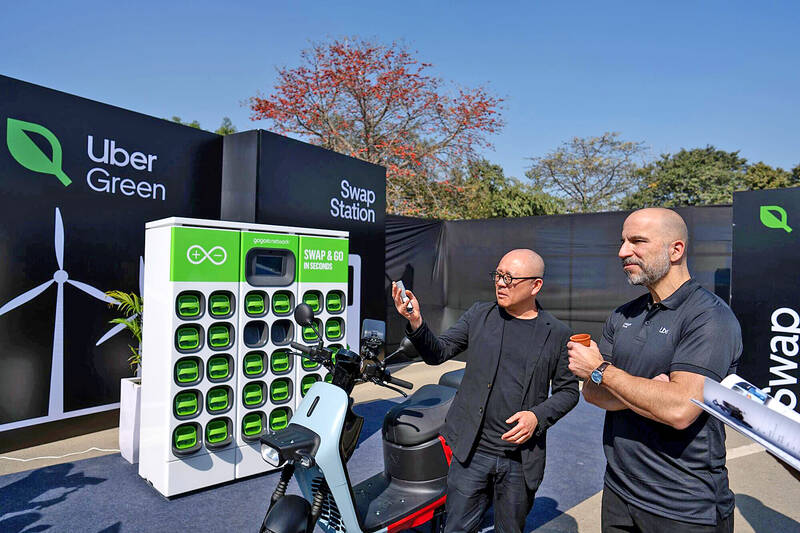Gogoro Inc (睿能創意), the nation’s biggest electric scooter maker, yesterday said that its chairman and CEO Horace Luke (陸學森) has resigned amid chronic losses and probes into the company’s alleged involvement in subsidy fraud.
The board of directors nominated Reuntex Group (潤泰集團) general counsel Tamon Tseng (曾夢達) as the company’s new chairman, Gogoro said in a statement. Ruentex is Gogoro’s biggest stakeholder.
Gogoro Taiwan general manager Henry Chiang (姜家煒) is to serve as acting CEO during the interim period, the statement said.

Photo: Anindito Mukherjee, Bloomberg
Luke’s departure came as a bombshell yesterday. As a company founder, he has played a key role in pushing for the company’s expansions at home and abroad, as well as Gogoro’s initial public offering on the NASDAQ.
Gogoro did not disclose the reason behind Luke’s decision to leave the company he founded 13 years ago.
“After much reflection, I have made the difficult decision to step down from my role as CEO and chairman of Gogoro. This decision has not been easy, but I believe it is the right time for the company and I to transition leadership as we embark on the next phase of growth,” Luke said in an internal e-mail sent to Gogoro employees. “My confidence in Gogoro’s bright future remains steadfast. I will always be Gogoro’s biggest advocate, and I look forward to seeing the company continue to grow and succeed from a new vantage point.”
As the company has been struggling to eke out a profit, poor financial performance is widely considered to be the main factor for Luke’s departure. Losses ballooned from US$5.6 million in the second quarter last year to US$20.1 million for the same period this year. Gross margin also plunged from 15.2 percent a year ago to 5.2 percent last quarter.
As of Thursday, Gogoro’s stock price has tumbled about 92 percent from its closing price of US$14.02 during its IPO in 2022 to US$1.05, indicating that investors have lost confidence in the company’s prospects.
In addition, former employees have tipped off the Ministry of Economic Affairs about Gorogo’s alleged subsidy fraud, Business Today reported on Wednesday.
Gogoro has allegedly been using Chinese engines and key parts to reduce manufacturing costs, despite reporting to the ministry that it was using locally made parts to get government subsidies, it said.
Gogoro has received more than NT$600 million (US$18.75 million) in subsidies by allegedly faking domestic key components, the report said.
The ministry said it has received tip-offs and is investigating Gogoro’s practices. The ministry grants special subsidies to encourage adoption of domestically made key parts.

NEW IDENTITY: Known for its software, India has expanded into hardware, with its semiconductor industry growing from US$38bn in 2023 to US$45bn to US$50bn India on Saturday inaugurated its first semiconductor assembly and test facility, a milestone in the government’s push to reduce dependence on foreign chipmakers and stake a claim in a sector dominated by China. Indian Prime Minister Narendra Modi opened US firm Micron Technology Inc’s semiconductor assembly, test and packaging unit in his home state of Gujarat, hailing the “dawn of a new era” for India’s technology ambitions. “When young Indians look back in the future, they will see this decade as the turning point in our tech future,” Modi told the event, which was broadcast on his YouTube channel. The plant would convert

‘SEISMIC SHIFT’: The researcher forecast there would be about 1.1 billion mobile shipments this year, down from 1.26 billion the prior year and erasing years of gains The global smartphone market is expected to contract 12.9 percent this year due to the unprecedented memorychip shortage, marking “a crisis like no other,” researcher International Data Corp (IDC) said. The new forecast, a dramatic revision down from earlier estimates, gives the latest accounting of the ongoing memory crunch that is affecting every corner of the electronics industry. The demand for advanced memory to power artificial intelligence (AI) tasks has drained global supply until well into next year and jeopardizes the business model of many smartphone makers. IDC forecast about 1.1 billion mobile shipments this year, down from 1.26 billion the prior

People stand in a Pokemon store in Tokyo on Thursday. One of the world highest-grossing franchises is celebrated its 30th anniversary yesterday.

Zimbabwe’s ban on raw lithium exports is forcing Chinese miners to rethink their strategy, speeding up plans to process the metal locally instead of shipping it to China’s vast rechargeable battery industry. The country is Africa’s largest lithium producer and has one of the world’s largest reserves, according to the US Geological Survey (USGS). Zimbabwe already banned the export of lithium ore in 2022 and last year announced it would halt exports of lithium concentrates from January next year. However, on Wednesday it imposed the ban with immediate effect, leaving unclear what the lithium mining sector would do in the